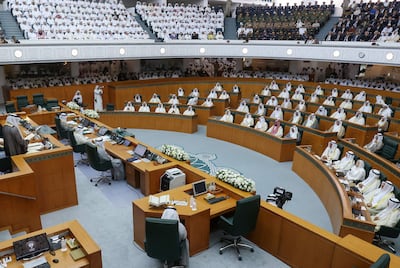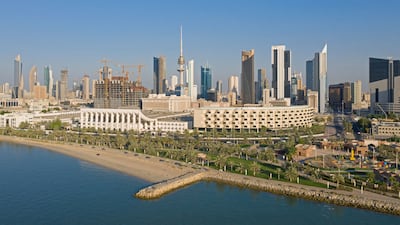Kuwait's four-year government action plan includes no mention of VAT, it has been revealed ahead of a parliamentary debate on Tuesday.
The National Assembly will discuss the government’s 2023-2027 action plan, which includes 107 major projects across the economic, social, entertainment and human resources fields, as well as a proposal to introduce corporate tax.
However, VAT is not on the agenda despite an International Monetary Fund recommendation and an agreement to follow a wider GCC framework on taxes.
The 60-page document, seen by The National, confirmed the government does not plan to introduce either VAT or excise tax.
Earlier, Finance Ministry sources told local media outlets that excise tax could be included on items such as tobacco, sweet drinks and luxury goods but only in the future.
The government set a 2024 deadline for it to put in place a general corporate tax framework, including legislative requirements and executive mechanisms.
Analysts who spoke to The National said neither VAT or excise tax would be possible in the coming years, even if proposed by the Finance Ministry, as they would not receive enough support to pass in parliament.
Pressure to introduce VAT
“The government’s programme has no mention of plans to either introduce VAT or even excise tax, but it only specifically mentioned corporate taxes,” Kuwaiti economist Mohammed Albaghli told The National.
Kuwait has come under mounting pressure to introduce VAT or other taxes since it signed a GCC framework agreement in 2016. Of the six member states, only Kuwait and Qatar have yet to introduce legislation to introduce the tax.
Analysts believe the Kuwaiti government, the fifth in less than a year under Prime Minister Sheikh Ahmad Nawaf Al Sabah, has avoided making any mention of planned legislation as it aims to repair its long-standing feud with parliament over economic reforms.
“It will be hard to see how VAT will be included when the government is under both populist and parliamentary pressures,” Clemens Chay, a research fellow and expert on Kuwait at the National University of Singapore’s Middle East Institute, told The National.
Luai Allarakia, a University of Richmond assistant professor who focuses on the Kuwaiti National Assembly, said the introduction of VAT was unlikely.
“It will face tense opposition from the Kuwaiti National Assembly and the fact that it’s not mentioned in the [government] programme makes rejecting it even more likely by the National Assembly,” he said.
The process of introducing a levy such as VAT would prove quite complex and requires considerable and deliberate effort on the part of the state, said Omar Al Ubaydli, a political economy researcher.
“Moreover, like any tax, it provokes a negative response from the public,” he said. “For both reasons, as long as there is low fiscal pressure, the government's attitude is likely to be: Why should we voluntarily go through the ordeal?”

Several MPs in the current parliament, the country’s third in three years owing to political gridlock, have criticised the government’s four-year plan.
Before the start of parliament’s session on Tuesday, legislators stressed that the government action plan did not address important matters, particularly promises made concerning political reforms and measures to improve the standard of living of citizens.
Dania Thafer, executive director of the Gulf International Forum, told The National that the plan was not very different from what previous governments
“Many view it to be recycled talking points. The problem in Kuwait is not about presenting projects; it’s about execution and co-operation between the parliament and government,” she said.
The action plan is normally issued soon after the formation of a new cabinet. The government has already faced two resignations in the past week.
Manaf Al Hajeri resigned as Finance Minister less than three months into the job. He was replaced by Saad Al Barrak, who was named both Oil Minister and Minister of State for Economic and Investment Affairs.
Local media said Mr Al Hajeri's resignation stemmed from his objection to a move to put the Kuwait Investment Authority under the supervision of Mr Al Barrak.
Stand-offs
Kuwait, which borders Saudi Arabia and Iraq, is home to 7 per cent of the world's crude reserves. It has one of the strongest sovereign wealth funds in the world and little debt.
However, it suffers from constant stand-offs between MPs and cabinets appointed by the ruling family.
Under its new four-year plan, Kuwait announced it would establish a sovereign fund to develop its local economy, spearhead mega projects and attract funds from foreign investors and the private sector.
The Ministry of Finance and the KIA plan to set up the Ciyada Development Fund, according to the work programme.
The KIA is the world's oldest sovereign wealth fund, with about $800 billion in assets under management, according to the Sovereign Wealth Fund Institute and Global SWF that track state-owned investors.
“The latest developments include an acknowledgement by the parliament that some of the state’s financial burdens can be alleviated by a robust private sector, including the housing and real estate domains,” Mr Chay told The National.
“If pushed through, the Kuwaiti private sector will be offered massive opportunities but [it] must be operationally prepared.”


